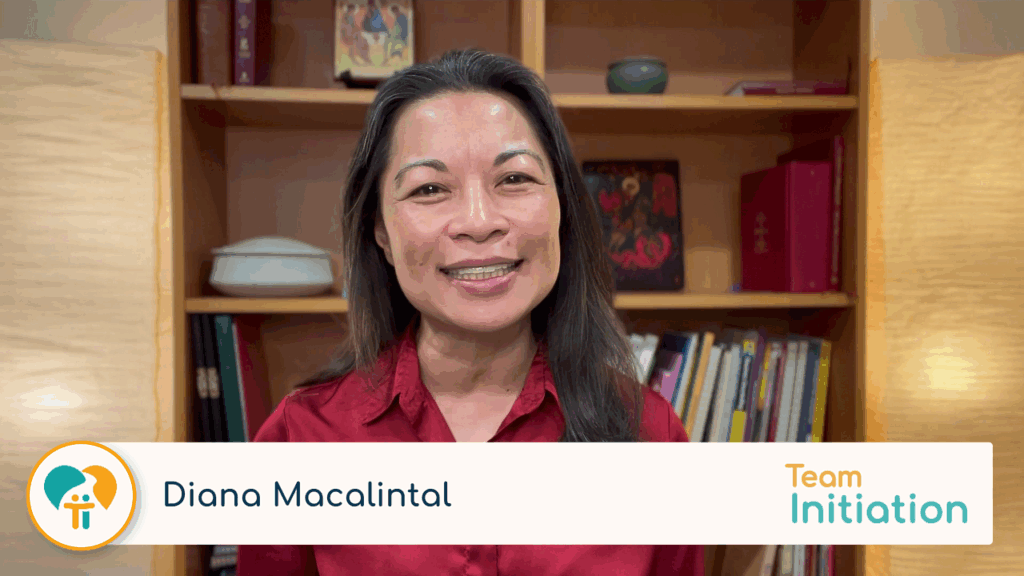I celebrated my first Communion when I was in first grade, as did my entire class. And I celebrated confirmation in third grade, as did all the children in my school. That’s because that was the year the bishop came to our parish to administer the sacrament. Our sacraments were scheduled on the school calendar and the bishop’s calendar.
We must have had a curriculum that we learned, but I couldn’t tell you today what it was. First Communion and confirmation happened on a pre-set schedule without any discernment about our readiness to live as disciples. Many of us in catechumenate ministry today grew up with similar experiences, and this model affects how we approach initiation ministry today. We sometimes transfer our expectations of formal religious education from our childhood onto a process that is meant to be gradual, accommodated to the individual, and led by the Holy Spirit.
The church tells us clearly that the initiation of adults is a gradual, step by step process (OCIA 4). This stands in contrast to the way most of us experienced sacramental preparation as children. What does “gradual” mean? Gradual means unrushed, proceeding step-by-step, increasing by degrees. It is the opposite of hurried, rushed, crammed, or sudden.
There are solid theological and pastoral reasons why gradual initiation is so critical. Foremost is that conversion doesn’t happen on a schedule or because someone has reached a particular grade or age. Conversion happens slowly, through a series of smaller awakenings. For most of us, it does not happen all at once like St. Paul on the road to Damascus. More of us are like St. Peter, gradually coming to realize the fullness of what it means to say “yes” to Jesus.
Their life, their pace
Another reason a gradual process is important is that people are led by the Holy Spirit at different speeds based on their background, wounds, graces, and life situation. The way the rite phrases it is that the each person’s spiritual journey “varies according to the many forms of God’s grace, the free cooperation of individuals, the action of the Church, and the circumstances of time and place” (OCIA 5). A gradual process makes room for these variations.
And for seekers who are truly uncatechized, there is just too much that has to happen in a school model based on a December to April time frame. Trying cover a large amount of doctrine in a short amount of time reduces Christian discipleship to something like an all-night cram session when you didn’t study for the test. A gradual initiation process focuses on developing a deep intimacy with the person of Jesus Christ.
Discipleship needs time to take root. I have met seekers who show up converted, ready start evangelizing and working in the vineyard right away. But they are the exception.
Similarly, stacking up the rites and celebrating them without careful discernment about readiness to respond to the Holy Spirit can trivialize these sacred moments on the journey of faith. Gradual initiation ensures properly disposed hearts.
The bottom line is that discipleship needs time to take root. I have met seekers who show up converted, ready start evangelizing and working in the vineyard right away. But they are the exception. Most seekers are just sticking their toe in the water, carefully moving forward (and sometimes backward) step-by-step. Our formation processes should be tailored to accommodate the pace at which the Holy Spirit is leading each individual.
Just let it happen
What would a truly gradual initiation process look like? Here are a few tips:
- Let go of pre-set calendars. Allow each person’s journey to unfold according to the Spirit’s time frame.
- Use individual faith formation processes guided by the Holy Spirit, not a syllabus.
- Spend most of your time healing wounds and building relationships, less on imparting information.
- Seek spiritual conversion and maturity, not just doctrinal knowledge. Use apprenticeship more than classroom instruction.
- Make sure the “first proclamation” (the kerygma) is at the heart of everything you teach.
The gradual work of God in our hearts is part of “the mystery of salvation” (OCIA 75.1). We need to get out of the way and let it happen at its own pace. The way we were catechized as children should not govern the way we accompany seekers on the journey of faith today. The catechumenate offers us a privileged opportunity to cooperate with the Spirit and accompany seekers in their gradual conversion.
Learn more
We’re going to go much deeper into why a gradual process is critical to the conversion process and how to make it work in your parish in our next webinar. Registration is free, and we’d love to have you join us.
Learn more
For a description of some tools you can use to implement a gradual process in your community, see this article.
Can you help me out?
I’d love to know how this is landing. Can you share a word or a phrase about how this article resonates with you? Does it speak to your experience? Share your thoughts in the comments box below. Thanks for being part of the conversion!



















Excellent article, Nick. Hit me very strongly this morning: “A gradual initiation process focuses on developing a deep intimacy with the person of Jesus Christ.” “Gradual initiation ensures properly disposed hearts.” Both these sentences hit the heart of the matter. I think it is sometimes challenging for those of us raised in the Catholic faith (like me) to appreciate the depth and riches of our faith and how the Holy Spirit has led us gradually into a ever deeper relationship with Jesus Christ and the Father. Thank-you!
Hi Regina. Thanks so much for your comments. I agree that those of us raised in the Catholic faith can sometimes take for granted the depth and riches of our faith. The awesomeness of it all is just “ordinary” to us, and we can forget it is not at all ordinary to those who are new to the faith. I appreciate your insigts.
“Gradual means unrushed, proceeding step-by-step, increasing by degrees. It is the opposite of hurried, rushed, crammed, or sudden.”
And this is why we need to move away from school-type of learning and allow them to experience Christ in His own way with support and affirmation from the RCIA team. Bearing in mind what they they need to know and understand about the faith – they are led by spirit-filled leaders who guide and hold their hands and provide the space to encounter Christ personally and fully. Thank you for this article.
Hi Joana. Thanks so much for your comment. Your community is lucky to have you. Blessings on your ministry.
I have been Catholic 16 years 8 months and 25 days and can attest to the gradual process of conversion. I was peeled like an onion, one layer at a time was removed, my old self stripped away and incredibly this all happened without my recognizing what was happening. That, is the “slow work of God,” which is an ongoing process to this day. I have always shared in our sessions “Just get out of His way, step aside and let Him do the work and I promise you, the graces and blessings received, you could never have imagined. Let go.”
Dianne, that is such beautiful sentiment. I especially like your comment that the process is still going on to this day! Conversion is a life-long process. Thanks for sharing.
I couldn’t agree more with this article. What I am currently struggling with is helping individuals understand that initiation is all about developing a relationship with Christ and his Church and we can’t put a timeline on a relationship. In my initial conversation with seekers, I stress that there is no timeline. Unfortunately, I continuously come up against what other Catholics are telling our seekers and catechumens – “This should only take you about eight months.” “Just go to another parish. You should take classes from September until Easter and be finished.” It’s very frustrating, especially when an individual is not yet ready to take the next step on the journey.
Hi Erica. I’m sorry to how frustrating you situation is. Your parish is lucky to have you in place to help those seekers who truly want to encounter Christ. Thanks for all the good work you are doing. I’m praying for you.